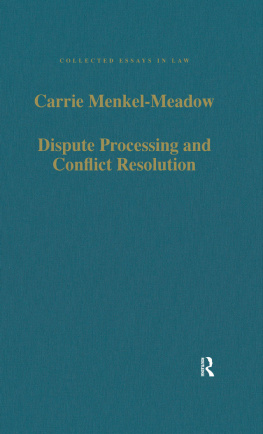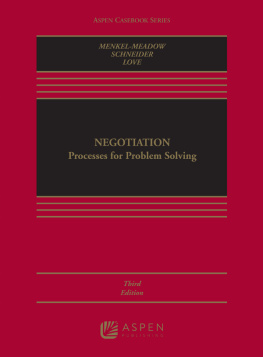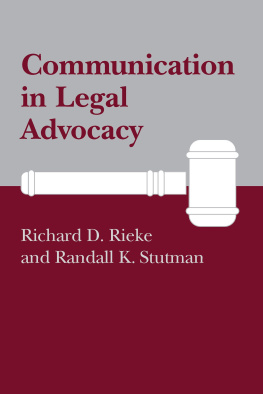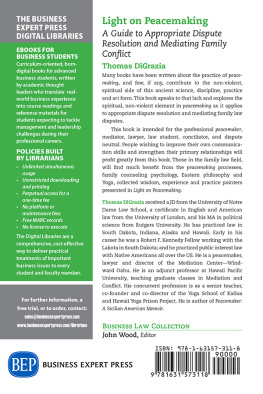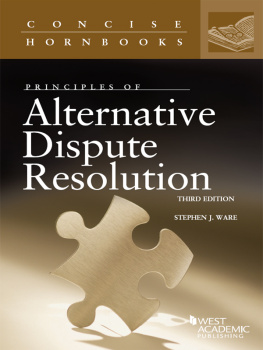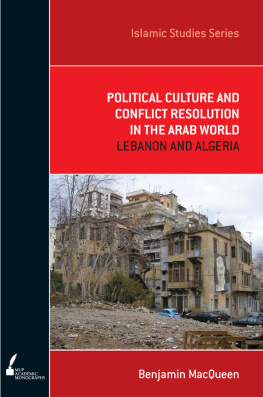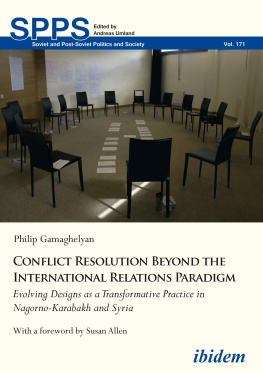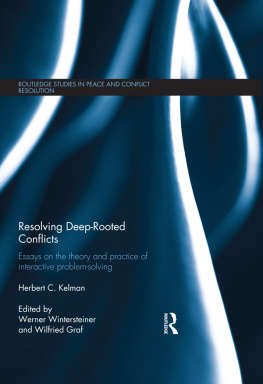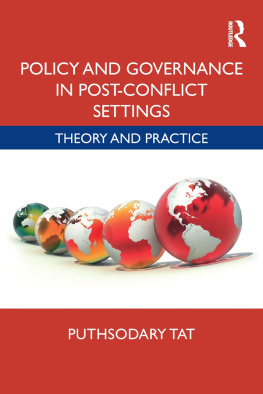COLLECTED ESSAYS IN LAW
Dispute Processing and Conflict Resolution
The Collected Essays in Law Series
General Editor: Tom D. Campbell
Law's Premises, Law's Promise: Jurisprudence after Wittgenstein
Thomas Morawetz
ISBN: 0 7546 2013 1
The Jurisprudence of Law's Form and Substance
Robert S . Summers
ISBN: 0 7546 2024 7
Regulation, Crime, and Freedom
John Braithwaite
ISBN: 0 7546 2005 0
Legal Rules and Legal Reasoning
Larry Alexander
ISBN: 0 7546 2004 2
The Great Juristic Bazaar: Jurists' Texts and Lawyers' Stories
William Twining
ISBN: 0 7546 2211 8
Carrie Menkel-Meadow
Dispute Processing and Conflict Resolution
Theory, Practice and Policy
First published 2003 by Ashgate Publishing
Published 2016 by Routledge
2 Park Square, Milton Park, Abingdon, Oxon OX14 4RN
711 Third Avenue, New York, NY 10017, USA
Routledge is an imprint of the Taylor & Francis Group, an informa business
Copyright 2003 Carrie Menkel-Meadow
Carrie Menkel-Meadow hereby asserts her moral right to be identified as the author of the Work in accordance with the Copyright, Designs and Patents Act 1988.
All rights reserved. No part of this book may be reprinted or reproduced or utilised in any form or by any electronic, mechanical, or other means, now known or hereafter invented, including photocopying and recording, or in any information storage or retrieval system, without permission in writing from the publishers.
Notice:
Product or corporate names may be trademarks or registered trademarks, and are used only for identification and explanation without intent to infringe.
British Library Cataloguing in Publication Data
Dispute processing and conflict resolution: theory, practice and policy. (Collected Essays in Law)
1. Dispute resolution (Law). 2. Conflict management. 3. Dispute resolution (Law) United States.
I. Menkel-Meadow, Carrie,
347'.09
Library of Congress Control Number: 2002117484
Transfered to Digital Printing in 2012
ISBN 9780754623052 (hbk)
To Margot and Gary Menkel, parents extraordinaire, who taught me about history, justice, ethics and most of all, caring.
Grateful acknowledgement is made to the following persons, editors publishers and institutions for their kind permission to reprint the essays included in this volume: Ohio State University Law Journal; University of Chicago Press, Illinois. Copyright 1983 by the American Bar Foundation; University of California, Los Angeles; Kiuwer Academic/Plenum Publishers, New York; The Florida State University, Tallahassee; Georgetown University Law Center; American Bar Association; Harvard Negotiation Law Review; Washington University in St Louis and Fordharn Law Review.
Collected Essays in Law makes available some of the most important work of scholars who have made a major contribution to the study of law. Each volume brings together a selection of writings by a leading authority on a particular subject. The series gives authors an opportunity to present and comment on what they regard as their most important work in a specific area. Within their chosen subject area, the collections aim to give a comprehensive coverage of the authors' research. Care is taken to include essays and articles which are less readily accessible and to give the reader a picture of the development of the authors' work and an indication of research in progress.
The initial volumes in the series include collections by Professors Frederick Schauer (Harvard), Constitutional Interpretation, John Braithwaite (ANU), Regulation, Crime and Freedom, Tom Morawetz, Law's Premises, Law's Promise, Robert Summers (Cornell), Law's Form arid Substance, and Larry Alexander (San Diego), Legal Rules and Legal Reasoning. These collections set a high standard for future volumes in the series and I am most grateful to all of these distinguished authors for being in at the start of what it is hoped will become a rich and varied repository of the achievements of contemporary legal scholarship

Carrie Menkel-Meadow is Professor of Law and Director of the Hewlett-Georgetown Program in Conflict Resolution and Legal Problem Solving at Georgetown University Law Center in Washington, DC. She is the editor of Mediation: Theory, Policy and Practice (2000), and Appropriate Dispute Resolution: Beyond the Adversarial Model (2003), the author of several books and over 100 essays on subjects ranging from dispute and conflict resolution, negotiation, mediation, legal procedure, legal theory, legal ethics, feminist theory, law and popular culture and legal education. She has won the CPR Institute for Dispute Resolution First Prize for Scholarship in ADR three times, (1983, 1991, 1998). In addition to her scholarship and teaching, Professor Menkel-Meadow has trained lawyers and mediators on five continents and is herself an active arbitrator and mediator in both private and public matters. She has taught at the law schools at Georgetown University, Harvard University, Stanford University, the University of Pennsylvania, the University of California at Los Angeles, the University of Toronto and Osgoode Hall, York University and has lectured throughout the world.
Professor Menkei-Meadow holds a BA magna cum laude from Barnard College, Columbia University, a JD cum laude from the University of Pennsylvania and an LL.D. (Hon.) from Quinnipiac College of Law. She is on the Board of Directors and Secretary of the American Bar Foundation, on the Executive Committee of the Center for Public Resources and is a member of the American Law Institute and the American College of Civil Trial Mediators.
From Legal Disputes to Conflict Resolution and Human Problem Solving
Legal Process, Conflict and Justice
The essays published in this volume represent my own intellectual journey, as well as a description of the evolution of the field of dispute resolution (rooted in legal studies) to the now broader field of conflict resolution that encompasses the study of disputes and conflicts, not only when they 'come to law' in legal disputes, but in all the forms of human conflict, including the interpersonal, domestic and international. While my work began in legal disputing, it quickly moved to the more interdisciplinary study of conflict resolution when I sought better solutions to human problems than those afforded by courts or unprincipled compromises in conventional negotiation processes. These essays focus on several important themes as dispute resolution in law has expanded to include the fuller study of human conflict situations. First, although necessary and important in some cases, conventional legal processes, such as adjudication and adversarial negotiation, are often inadequate for a fuller satisfaction of human needs and interests, so we must look to other processes than traditional institutions or practices, depending on the nature and kind of conflict or dispute at issue. With a growing availability of different kinds of process for different kinds of matters we are now developing a broader array of 'process institutions'. This is 'process pluralism' and should expand the focus of what is studied in law and jurisprudence. Second, while much of my work could be characterized as 'procedural' or 'process' driven, I am also concerned with exploring where our substantive solutions to human problems come from and how we can improve upon the human repertoire for problem-solving. This is the 'creativity' in human conflict resolution that I believe is necessary for our future survival. Third, developments in the parallel fields of legal dispute resolution and the more multidisciplinary conflict resolution provide us with a special opportunity to explore the correspondences, contrasts and learning from domestic disputes and international conflicts, as we test whether particular concepts, approaches and processes can be generalized or have only contextual validity. Finally, my work in the field of dispute and conflict resolution has always been a movement back and forth from theory development to practice, seeking what Donald Schon has called 'theory-inuse' (Schon, 1983; Schon and Rein, 1994) and what I have called 'ethical practice'- practice that is informed by theory and by morally legitimate uses. Disputes and conflicts are human constructs - we need theory to understand their causes, dynamics and trajectories of actions and reactions but, ultimately, we need practice to use conflict creatively and constructively, to make 'justice' in legal terms and to make 'peace' in human terms.



